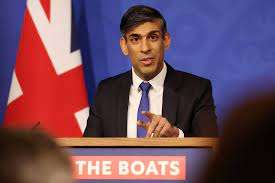Britain and its former partners in the European Union have reached a significant agreement aimed at enhancing cooperation in addressing illegal migration, marking a notable shift in relations post-Brexit.
In a statement released on Friday, February 23, the British government announced that UK border agencies and Frontex, the EU’s border and coast guard agency, can now access each other’s intelligence.
This collaboration aims to bolster border security and combat organized immigration crime effectively.
Additionally, the agreement entails joint training exercises, staff deployments between the two entities, and joint efforts in researching and developing new technologies to support their missions.
However, it’s important to note that the agreement, set to be signed in London at a later date, does not entail any bilateral returns agreement.
This means that neither party is obligated to accept asylum-seekers under the burden-sharing arrangements previously agreed upon among the EU’s 27 member states.
UK Home Secretary James Cleverly said, “Organized immigration crime and people smuggling are global challenges that require shared solutions and ambitions”.
“Our landmark working arrangement between the UK and Frontex is another crucial step in tackling illegal migration, securing our borders and stopping the boats,” he added.

Over the past few months, relations between Britain and the European Union have been on an upward trajectory after being strained during the prolonged and challenging divorce negotiations that ensued following the UK’s decision to leave the EU in 2016.
The formal split was finalized in early 2021 with the signing of a basic trade and cooperation agreement.
However, tensions persisted, particularly under the leadership of staunchly pro-Brexit UK Prime Minister Boris Johnson.
Since assuming office in October 2022, Prime Minister Rishi Sunak has been quietly working to mend fences and improve the United Kingdom’s relationship with its European counterparts.
Despite ongoing trade frictions and underlying mistrust, there have been notable efforts towards reconciliation. For instance, last year, Sunak agreed to Britain’s participation in the EU’s Horizon Europe program, a significant science-sharing initiative valued at $100 billion.
Rishi Sunak has prioritized tackling illegal immigration as a central tenet of his leadership.
The Continuous Stream Of Illegal Migrants Into The UK
In 2023, more than 29,000 individuals arrived in the UK via small boats, braving the perilous journey across the English Channel.
While this marked a decline from the previous year’s figure of nearly 46,000, Sunak remains committed to his pledge to “stop the boats.”
However, this commitment has also exposed him to criticisms, with some arguing that he has fallen short of achieving a key objective ahead of an impending general election, the timing of which he will determine.
Recent opinion polls indicate that Sunak’s Conservative party is trailing behind the main opposition Labour Party.
Moreover, there is evidence of a shift in support towards a new hard-right political party, which has centered its agenda on immigration-related issues.
This changing landscape adds further complexity to Sunak’s efforts to address illegal immigration and navigate political challenges in the lead-up to the upcoming general election.
As of 21 January 2024, 621 people had crossed the English Channel to the UK using small boats.
This method of crossing has been a significant point of concern for authorities and has drawn attention due to its risks and implications.
The composition of people crossing on small boats has evolved. While Iranian and Iraqi nationals previously represented a significant portion of arrivals, the first half of 2022 saw a shift.
Over half (51%) of small boat arrivals during that period were from three nationalities: Albanian (18%), Afghan (18%), and Iranian (15%).
Notably, there has been a substantial increase in Albanians crossing the Channel since May 2022. In those five months alone, 11,102 Albanians arrived by small boat, compared to a total of 815 in the entire year of 2021.
This trend highlights the changing dynamics of migration patterns and the need for targeted interventions.
READ ALSO: Minister Declines Support for Speaker Amid Gaza Vote Dispute





















